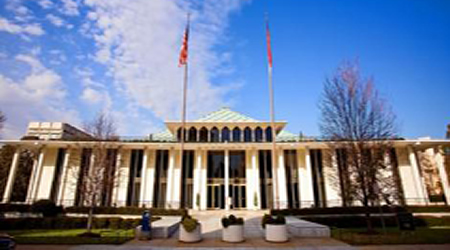A funny thing happened to House Bill 998, the Tax Simplification and Reduction Act, on its way through the state Senate.
It got simplified.
House Republicans had approved the bill in an effort to make good on their party’s pledges to cut taxes and shrink government. With Republicans holding strong majorities in both the House and Senate, and with the governor’s office also in GOP hands, there hasn’t seemed much reason to doubt that some version of “tax reform” as Republicans define it will take effect.
But there remain big disagreements as to what that version will be. Now, there will have to be a meeting of the minds between the chambers. From the standpoint of the N.C. Council of Churches and others concerned about tax equity and revenue adequacy, a back-to-the-drawing-board outcome would be the best of all.
As approved by the House, H.B. 998 in its main provisions would have lowered the personal income tax and corporate income tax rates and broadened the sales tax to include various repair and installation services.
The personal income tax would no longer include brackets requiring higher-income earners to pay at higher rates on income above certain amounts, a bedrock principle of progressive taxation. The House wanted to peg the rate at a flat 5.9 percent, down from the current top rate of 7.75 percent, with the stated goal of eventually getting rid of the tax completely in favor of a tax model geared to consumption – i.e., sales.
Under the House plan, people could continue to itemize deductions on their income tax returns, but some currently allowed deductions would be capped. A married couple filing jointly could deduct up to a total of $25,000 for mortgage interest and property taxes, a level that would affect mainly high-end taxpayers. However, an earlier move to cap deductions for charitable contributions was removed. That would help charitable non-profits, including churches, raise money and further their missions.
Senate leaders originally backed a plan that would have been more aggressive with the sales tax, extending it to cover about 130 services as well as purchases of food and medicine. The trade-off would be lower income taxes – a change that benefits affluent taxpayers the most. Meanwhile, poor people would be paying state sales tax on their groceries, prescriptions and car repairs. The equity problems should have been obvious.
Senate President Pro Tem Phil Berger acknowledged during June 13 debate that he had gotten the message regarding taxes on food and medicine. So the first Senate plan was sidetracked in favor of a rewritten H.B. 998 that would not apply the 4.75 percent state sales tax to food and medicine purchases.
In addition, the 2 percent local sales taxes on those purchases would come off. Localities could reinstate them if they wished to avoid large revenue losses, or they could raise property taxes. Neither would be popular, to say the least. The likely upshot: Counties and towns with less revenue to meet their needs for such things as school buildings, police, parks and transit.
In keeping with the simplification theme, the Senate’s version of H.B. 998 does not put the sales tax on services (although admission to movies and live performances would be taxed). A range of current sales tax exemptions would be abolished.
On the tax-cutting side, it would lower the personal income tax to a flat 5.4 percent in 2014, then to 5.25 percent in 2015. There would be no exemptions, deductions or credits, but the first $15,000 of income for a married couple filing jointly would not be taxed. The loss of tax deductions for charitable gifts clearly would be a concern for non-profits. So would the bill’s limits on the sales tax refunds to which non-profits now are entitled. The change would hurt hospitals, especially hard-pressed rural hospitals, as well as churches trying to pay for expansions.
Even more dramatically, the corporate income tax would be phased out altogether. Supporters hailed this as a move to enhance the state’s business climate and ultimately create more jobs. North Carolina’s long string of high rankings as a good place to do business – rankings that reflect many other factors besides tax rates, including a superlative community college system – apparently failed to register.
The big-picture problems with these tax reform plans are 1) the loss of revenue that the state needs to maintain key services and 2) the shifting of tax burdens away from well-off taxpayers, both individual and corporate.
For example, the Senate rewrite of H.B. 998 would mean net revenue losses estimated by legislative staff to total $4.6 billion over the first five years. That’s money no longer available to pay for adequate staffing in public school classrooms, to help keep those community colleges running effectively, to improve the state’s shaky mental health care system.
And even if most taxpayers would pay less, the biggest benefits would accrue to large, profitable companies and the wealthiest individuals. That turns the concept of tax fairness on its head.
Shortchanging state services to keep taxes low may be a formula that helps some taxpayers. But it’s a model that makes it harder for the state to press ahead with needed investments in education and health care. It puts vulnerable people at even more of a disadvantage. The tax reformers’ intentions may be noble, but their challenge now is to cobble together a plan from among those now in contention that reasonably looks out for the interests of every North Carolinian, rich or poor.
— Steve Ford, Volunteer Program Associate

